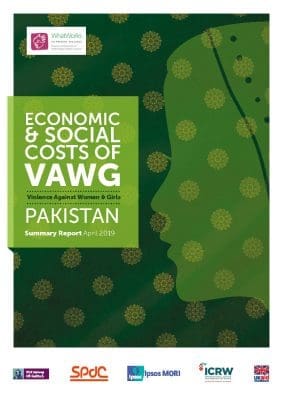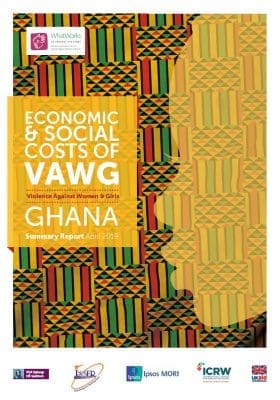
Violence against Women and Girls (VAWG) Component 3: Economic and Social Costs of VAWG
2015 - 2019
U.K. Department for International Development (DFID)
Ghana ,Pakistan ,South Sudan
National University of Ireland, Galway and Ipsos-Mori
Gina Alvarado
Violence against women and girls is not only a gross violation of human rights, it is a fundamental obstacle to achieving gender equality and eradicating global poverty.
While linkages between VAWG and economic outcomes are relatively clear at the theoretical level, there is a lack of comprehensive estimates of the economic and social impacts of VAWG that can capture direct tangible, direct intangible and indirect tangible costs at the household, business, community and national level. There is also a need for more standardized guidance to measuring economic and social costs particularly in low and middle income countries.
What did we set out to do?
To address these challenges, the International Center for Research on Women, Ipsos-Mori—part of the National University of Ireland, Galway-led consortium funded by the U.K. Department for International Development (DFID)—embarked on a new study to investigate the social and economic costs of violence against women and girls in developing countries.
What methods did we use?
The project took a multi-disciplinary approach, involving experts in economics and the social sciences, including political science, sociology, gender studies, public health and psychology. The study aimed to move beyond an exclusive focus on intimate partner violence and will consider forms violence perpetrated against women and girls within the home and community.
The project built on existing data in order to adapt a conceptual framework and develop empirical methods, both quantitative and qualitative, for measuring the economic and social costs of violence at individual, household, sectoral and national levels. The research was undertaken in three countries—Ghana, Pakistan and South Sudan—representing fragile, conflict affected and/or low-middle income states. It included surveys with over 4,500 women across those countries as well as in-depth interviews with survivors of VAWG.
By producing new empirical research and evidence on the economic and social costs of VAWG, the research project strengthens the argument for resources to implement laws, provide health and social support services and to mobilize communities to shift the social norms that underpin VAWG.


